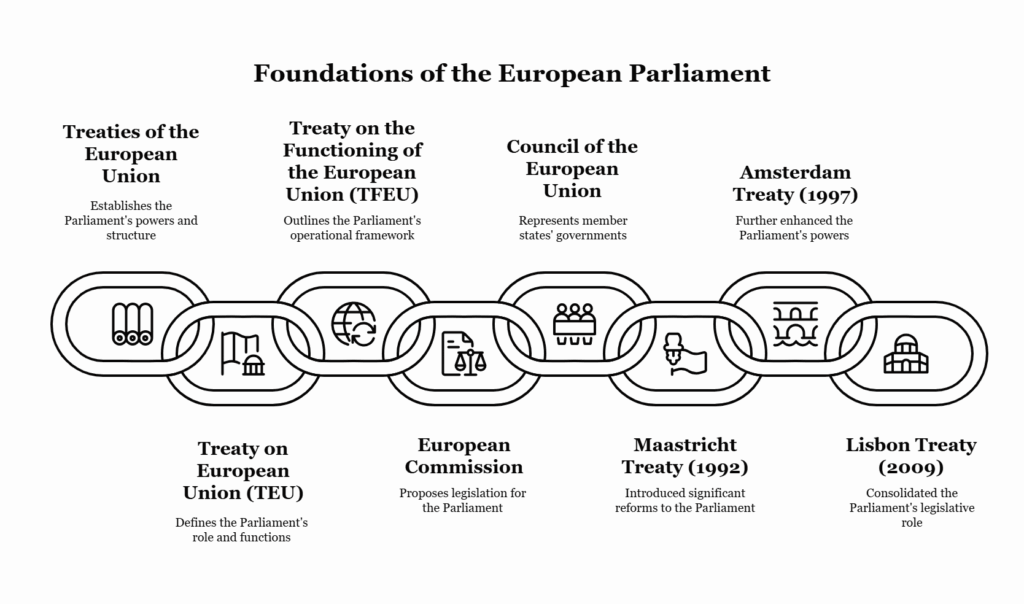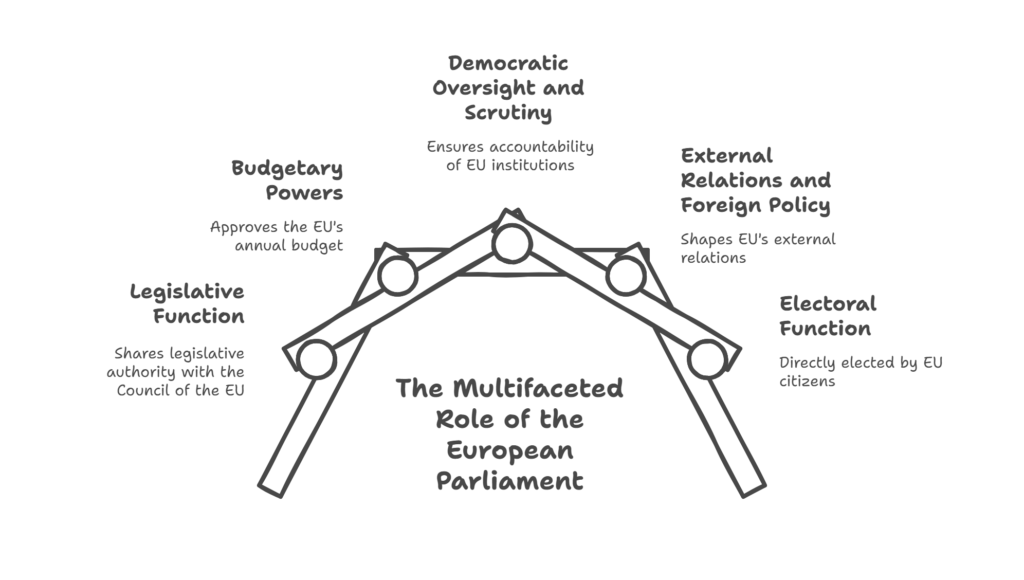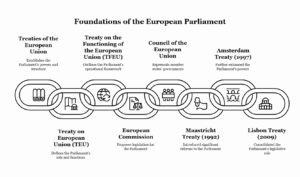The European Union (EU) Parliament, formally known as the European Parliament (EP), is one of the central institutions of the EU, playing a pivotal role in shaping EU legislation, scrutinizing the work of other EU institutions, and representing the interests of EU citizens. It is one of the few directly elected bodies in the EU and is often described as the democratic heart of the Union. The Parliament’s powers have expanded over time, particularly through key treaties such as the Maastricht, Amsterdam, and Lisbon Treaties.
Constitution of the European Parliament
The European Parliament’s constitution, as such, is derived from the Treaties of the European Union, which establish its powers, functions, and structure. The Parliament is a key institution of the EU’s legislative branch, alongside the Council of the European Union. While it is not a “federal” legislature in the traditional sense, it plays a significant role in the legislative and policy-making process of the Union.
The European Parliament is established under the Treaty on European Union (TEU) and the Treaty on the Functioning of the European Union (TFEU). It operates in conjunction with the European Commission, which proposes legislation, and the Council of the EU, which represents member states’ governments. Parliament’s powers are also defined through various reforms brought about by treaties, most notably the Maastricht Treaty (1992), the Amsterdam Treaty (1997), and the Lisbon Treaty (2009).

Role and Function of the European Parliament
- Legislative Function
The European Parliament shares legislative authority with the Council of the EU in most policy areas. It plays an essential role in the adoption of EU legislation through the ordinary legislative procedure (formerly known as the co-decision procedure), which is the standard process for passing most EU laws. This procedure requires both the European Parliament and the Council to agree on proposed legislation.
- Voting: Parliament’s members vote on legislation that is proposed by the European Commission. They can approve, amend, or reject proposals. If the Parliament and the Council disagree on a legislative proposal, the matter is sent back for further negotiation. The role of the European Parliament in this process ensures democratic oversight and prevents unilateral decisions by the Council or Commission.
- Sectoral Legislation: Parliament influences a wide range of policy areas, including trade, the environment, consumer protection, health, competition law, and justice. The European Parliament’s Committees play a vital role in reviewing and shaping legislation in specific areas.
- Budgetary Powers
The European Parliament holds significant powers in the budgetary process. It works with the Council to approve the EU’s annual budget, which dictates the Union’s spending priorities. Parliament has the power to amend the budget, and it can also reject it entirely, although the final decision rests with the Council. This is an important function, as it gives Parliament the ability to influence the allocation of EU funds.
- Expenditure and Revenue: The Parliament also plays a key role in shaping EU policies on spending, including subsidies for agriculture, regional development, and research. Additionally, it influences the financing of various EU programs, such as the Common Agricultural Policy (CAP).
- Democratic Oversight and Scrutiny
One of the most crucial roles of the European Parliament is to ensure the democratic accountability of the EU’s institutions. The Parliament exercises scrutiny over the European Commission, the European Council, and other bodies of the EU.
- Approval of the European Commission: The European Parliament approves the nomination of the European Commission President and the Commissioners. This gives Parliament a direct say in the composition of the Commission, which is responsible for proposing EU laws. The EP also has the power to dismiss the entire Commission through a motion of censure, a rare but significant power.
- Scrutiny of Policies and Activities: Parliament holds question sessions, debates, and hearings to examine the work of the European Commission and other EU bodies. It can request investigations into specific issues and exert political pressure on the executive to implement its policies.
- Petitions and Public Opinion: Parliament represents the interests of EU citizens through its petitions committee, where individuals can submit complaints about EU policies or request action. This provides a direct channel for public participation in EU affairs.
- External Relations and Foreign Policy
While the European Parliament does not have formal decision-making powers in the area of foreign policy, it plays an important role in shaping the EU’s external relations. It must approve key international agreements, including trade agreements and association agreements with non-EU countries. In certain cases, such as agreements with developing countries or human rights-related issues, Parliament’s consent is necessary.
Furthermore, the European Parliament participates in the work of international bodies, such as the United Nations and the World Trade Organization (WTO), through its committees and delegations.
- Electoral Function
The European Parliament is directly elected by EU citizens every five years through European Parliament elections. The elections are held in all EU member states, with each country allocating seats based on its population size. This gives citizens a direct voice in EU governance, ensuring the Parliament’s democratic legitimacy.
- Political Groups: Members of the European Parliament (MEPs) are organized into political groups that align with their political ideologies, such as the European People’s Party (EPP), the Progressive Alliance of Socialists and Democrats (S&D), and the Alliance of Liberals and Democrats for Europe (ALDE). These groups negotiate and work to shape EU policies based on their collective interests.

Conclusion
The European Parliament is a crucial institution in the EU’s governance system. It plays a central role in the legislative, budgetary, and democratic functions of the Union. Through its legislative powers, it directly influences the laws and policies that affect the daily lives of EU citizens. Its role in overseeing the work of the European Commission and other institutions ensures that the EU operates transparently and is accountable to its citizens. Additionally, the Parliament’s role in shaping the EU’s external relations and representing the public makes it an essential pillar of European integration and democracy. While its powers have expanded over time, particularly through successive EU treaties, the European Parliament continues to evolve, reflecting the growing importance of democratic participation in the EU’s decision-making processes.








Leave a Reply